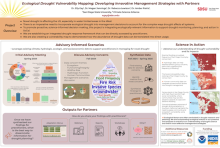Integrating Stakeholder Concerns into Ecological Drought Vulnerability Mapping
San Diego State University
Poster
The United States is experiencing more intense and variable extreme droughts, which disproportionately impact ecosystems and communities, especially in water-limited regions. Despite this growing challenge, management strategies remain fragmented and largely reactionary, hindered by the slow onset and regional variability of drought conditions. These issues are compounded by an abundance of data that is often not translated into actionable science. Consequently, there is a critical need for approaches that synthesize data to better understand socio-ecological vulnerability to drought and inform proactive management strategies.
To address this need, we collaborated with a stakeholder advisory group to apply an ecological drought framework to operationalize drought management in Southern California, USA. Stakeholders identified key drought concerns across four categories: ecosystem health and integrity, hydrologic functioning, fire risk, and impacts on human communities. Leveraging existing datasets, we identified relevant indices to address these concerns, mapped human and ecological vulnerabilities to extreme drought, and highlighted data gaps. This approach demonstrates how readily accessible data can inform targeted management actions.
This study develops a comprehensive ecological drought vulnerability index, depicting spatial patterns of vulnerability, highlighting at-risk regions and ecosystems, and demonstrating how scientific data can drive actionable management. By operationalizing a replicable, stakeholder-informed framework, we aim to advance understanding of the drivers of drought vulnerability and foster more resilient socio-ecological systems under novel conditions.
To address this need, we collaborated with a stakeholder advisory group to apply an ecological drought framework to operationalize drought management in Southern California, USA. Stakeholders identified key drought concerns across four categories: ecosystem health and integrity, hydrologic functioning, fire risk, and impacts on human communities. Leveraging existing datasets, we identified relevant indices to address these concerns, mapped human and ecological vulnerabilities to extreme drought, and highlighted data gaps. This approach demonstrates how readily accessible data can inform targeted management actions.
This study develops a comprehensive ecological drought vulnerability index, depicting spatial patterns of vulnerability, highlighting at-risk regions and ecosystems, and demonstrating how scientific data can drive actionable management. By operationalizing a replicable, stakeholder-informed framework, we aim to advance understanding of the drivers of drought vulnerability and foster more resilient socio-ecological systems under novel conditions.
Poster PDF

Meeting homepage